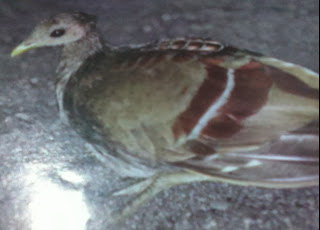Birds Mamoa :
Egg size five times larger than chicken eggs
Birds Mamoa ( Eulipo wallacei )That breed in North Maluku , Indonesia. is a bird that lives
naturally in the Halmahera region . Precisely in Galela district , northern
Halmahera . Bird nests can be found in kawassan mamoa sand beaches and bush .
This bird has a very large egg , roughly five times larger than regular chicken
eggs .
Mamoa birds have Characteristics including : form strong legs ,
big feet and thick structure with strong claws to pile sand or soil .
Birds mamoa not incubating eggs . Egg incubation is done by
geothermal heat coming from the sun . Lay their eggs in the sand on the beach
or at a certain depth in the forest by way of stockpiling soil and litter at a
height of 1.5 meters . Bird hatching success is highly dependent on temperature
or soil temperature . The results of a study to inform you that the soil
temperature is needed to incubate the eggs mamoa ranged between 32-35 degrees
Celsius . Its takes a long while for 62-86 days . Almost of all types
mamoa have spawn near shore habitat .
Baby from mamoa birds have the ability to fly and run
fast on the way out of the nest , without the care of its mother .
Competitors mamoa bird in food are birds that have the same
type of food ( fruit , seeds and invertebrates ) and foraging on the beach and
the forest .
Another characteristic of this bird is brown fur , the skin around the face , pink , brown irises , dark legs . On the back there is a cross -shaped motif and cover the wings of a dark red tipped gray . Ana bird is brown with black legs and beak .
The main problem faced in sustaining bird populations mamoa
is a very sharp decline in almost every habitat because of the exploitation of
their eggs , habitat degradation and fragmentation of habitat . Exploitation of
eggs is mainly caused by a lack of public awareness . Deterioration of the
quality of habitat caused by deforestation due to logging and forest
encroachment , while the extent of habitat loss due to forest conversion and
illegal cultivation.




